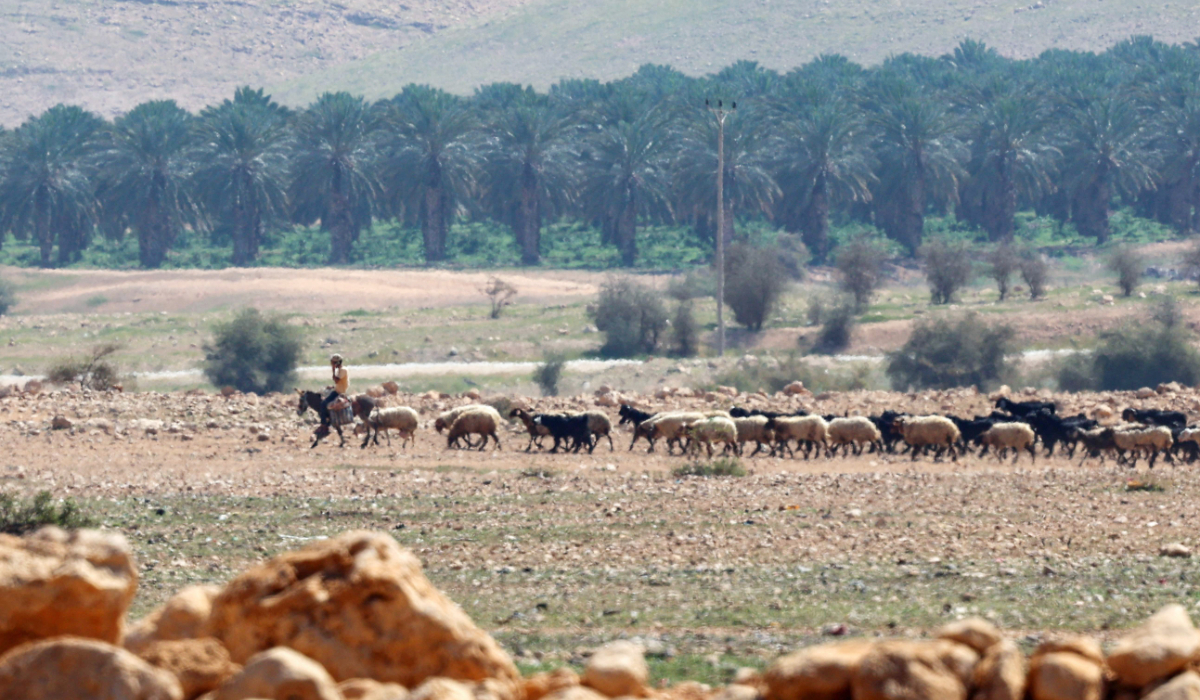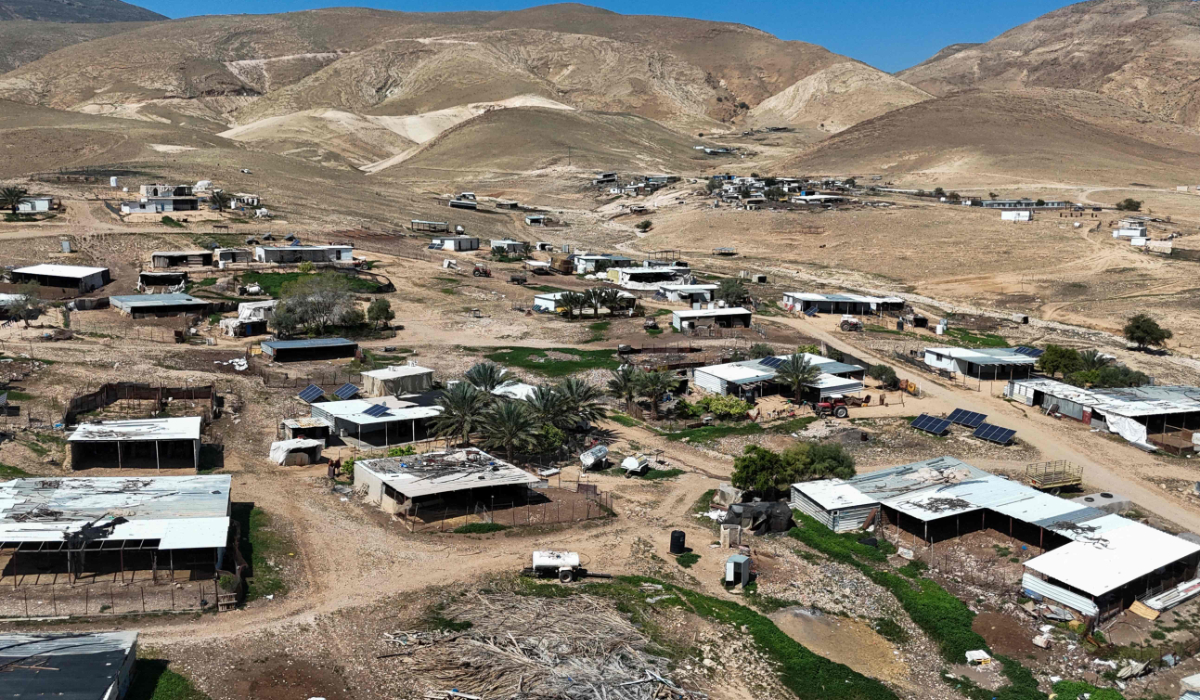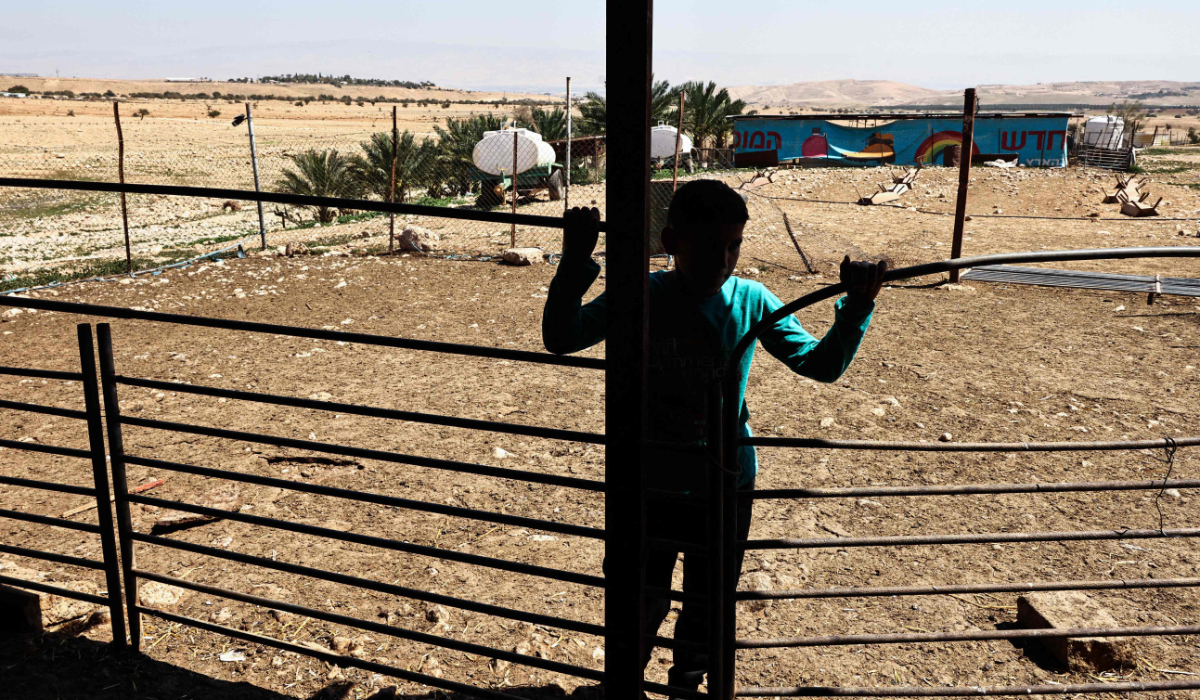JERICHO, Palestinian Territories: A community of Palestinian Bedouins has decried a major theft of their livestock in the occupied West Bank, where the UN says violence from Israeli settlers is taking place in a climate of impunity.
On March 7, dozens of Israeli settlers, some of them armed, attacked Palestinian residents in Ras Ein al Auja while under the protection of Israeli forces, according to the UN’s Office for the Coordination of Humanitarian Affairs (OCHA).
Resident Haitham Suleiman Zayed described how around 40 vehicles arrived in the pastoral area in the Jordan Valley, accompanied by “army forces and armored Israeli vehicles.” More than 1,500 livestock were stolen, he said.

An Israeli settler herds a flock near the bedouin community of al-Auja west of Jericho in the Israel-occupied West Bank on March 16, 2025, which was attacked the previous week by Israeli settlers who reportedly stole sheep. (AFP)
“We tried to confront them by throwing stones at them to make them move away from this enclosure, but we could not do that,” Zayed, 25, told AFP, adding that Israeli forces had intervened to protect the thieves, whom he referred to as settlers.
Contacted by AFP, the Israeli military referred to a police statement issued the day after the incident.
The statement said police had intervened after receiving a report regarding the theft of 50 sheep from Zohar’s farm — a settler outpost run by Zohar Sabah, an Israeli targeted in November by United States sanctions against settlers involved in acts of violence.

This picture shows a view of the Bedouin community of al-Auja west of Jericho in the Israel-occupied West Bank on March 16, 2025, which was attacked the previous week by Israeli settlers who reportedly stole sheep. (AFP)
The sanctions introduced by the administration of former president Joe Biden were canceled by President Donald Trump on his return to power.
“Police and (Israeli) forces began searching for the flock and arrived at a Bedouin encampment near the Palestinian village of Auja, where they located the (settler’s) stolen flock,” the Israeli police statement said.
“The Palestinian suspect was arrested and taken for interrogation, where he admitted to the act,” it added.

A boy from the bedouin community of al-Auja looks at an empty sheepfold after sheep were reportedly stolen by Israeli settlers in an attack the previous week, west of Jericho in the Israel-occupied West Bank on March 16, 2025. (AFP)
OCHA said that according to eyewitnesses, “settlers physically assaulted and injured a Palestinian man, stole approximately 1,400 livestock, killed 12 goats, and damaged at least three houses and several solar panels.”
The Palestinian man injured during the confrontation was “restrained by Israeli police while settlers beat him,” the UN office added.
Israel has occupied the West Bank since the 1967 Arab-Israeli War.
Excluding annexed east Jerusalem, the territory is home to nearly three million Palestinians and around 490,000 Israelis who live in settlements considered illegal under international law.
“The transfer by Israel of parts of its own civilian population into the territory it occupies amounts to a war crime,” UN rights chief Volker Turk said in a statement on Tuesday.
“Israel must immediately and completely cease all settlement activities and evacuate all settlers, stop the forcible transfer of the Palestinian population, and prevent and punish attacks by its security forces and settlers,” he added.
His comments came as his office released a new report on the situation in the West Bank between October 2023 and last November.
“The line between settler and state violence (has) blurred to a vanishing point, further enabling an increase in violence and impunity,” the report said.
OCHA said that Israeli settlers in February bulldozed an area of Ras Ein al Auja to build a road connecting two settlement outposts.
“From Masafer Yatta in the south to the northern Jordan Valley in the north, there is not a single square meter safe from settler attacks,” said Zayed.
“The main goal is to displace people,” he added.
Throughout the Gaza war, violence in the West Bank — a separate Palestinian territory — has soared, as have calls to annex it, most notably from Israel’s far-right Finance Minister Bezalel Smotrich.
Since early last year, the territory has seen a string of attacks by Palestinians on Israeli targets, as well as violence by Israeli settlers against Palestinian communities.
Since the start of the war in October 2023, Israeli troops or settlers have killed at least 911 Palestinians, including many militants, according to the Palestinian health ministry.
Palestinian attacks and clashes during military raids have killed at least 32 Israelis over the same period, according to official figures.
















